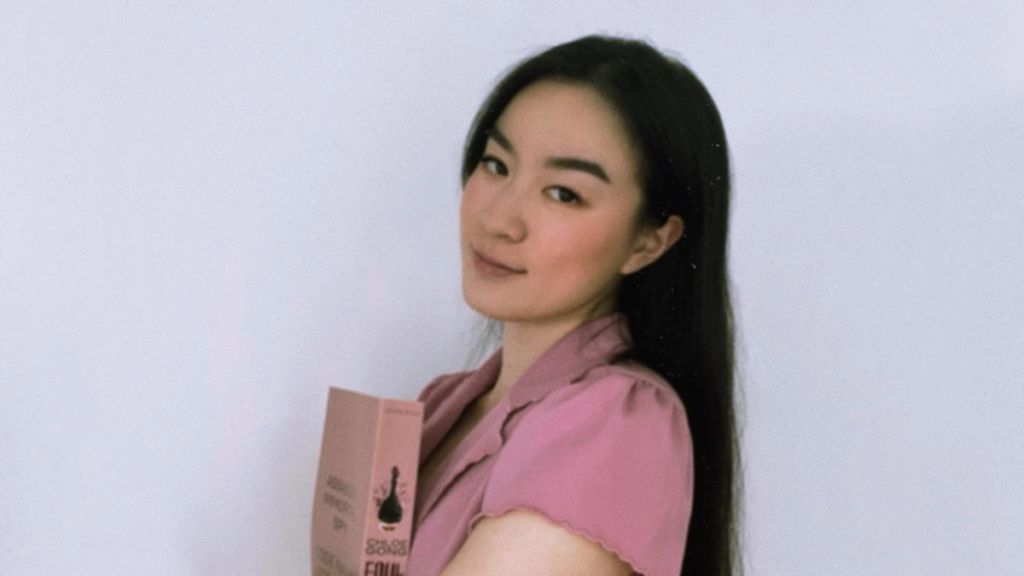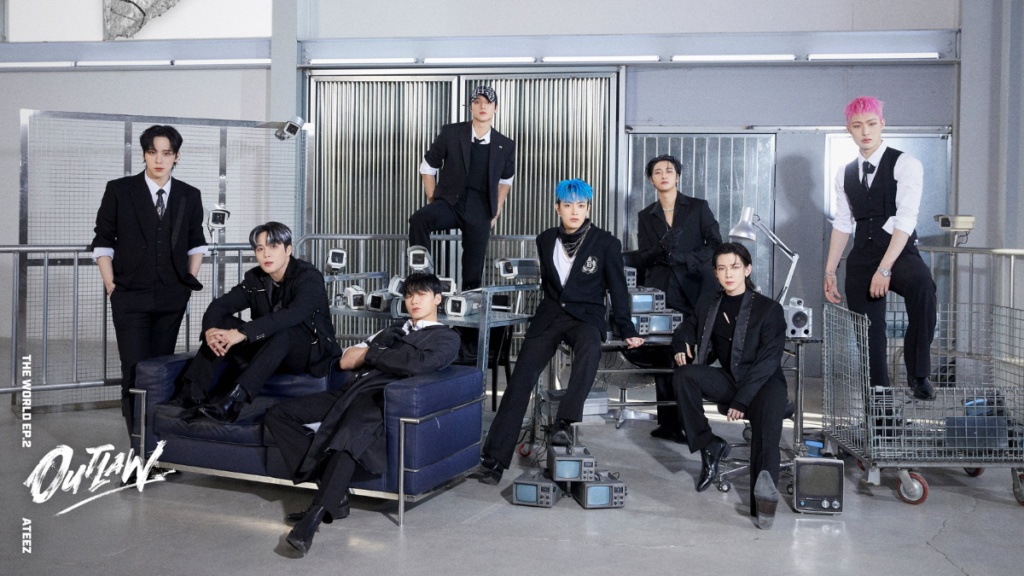Creative Spotlight: Chloe Gong, Author of Foul Lady Fortune, Is Carving Her Own Path

If New York Times bestselling author Chloe Gong was a spy, “Chrysanthemum” would be her agent name. “I feel like your agent name, your code name, has to be something slightly representative but not too representative because you don’t want it to be a give away,” she mused, pondering the unexpected question.
The author of the These Violent Delights duology and the new young adult novel Foul Lady Fortune eventually settled on the white flower that makes delicious tea. Just like a successful spy, Gong’s choice of a chrysanthemum has another side to it: the flower is often seen at Chinese funerals.
As soon as she realized this, the eyes of the 23-year-old writer lit up. “Maybe then that’s even more mysterious. You’re the gift that comes in when someone dies,” she added. “You’re the assassin, the Chrysanthemum assassin.” The ideas just kept rolling, as Gong leaned forward towards the computer screen and pointed a finger in emphatic finality. “It’s also a relaxing tea, right? So you put people to sleep…to death!”
Our conversation very quickly turned to murder for good reason. On September 27, Gong released Foul Lady Fortune, her third young adult book. It recently debuted at No. 3 on the New York Times Bestsellers list and No.1 on the Indie Bestsellers list. The 500-page spinoff novel follows Rosalind Lang, the infamous cousin of Juliette Cai from Gong’s These Violent Delights duology. Now, a decade later, Rosalind is a spy, determined to remedy the deadly mistakes she made. Code name? Fortune.
To celebrate the release of Foul Lady Fortune, EnVi connected with Chloe Gong over Zoom to discuss writing spinoffs, how her craft has changed over the years, and ensuring she is a person before she is a writer.
Step Into the World of Foul Lady Fortune
Although the backdrop of Foul Lady Fortune is 1930s Shanghai, Rosalind is the same age she was at the end of Gong’s first duology. The eldest Lang daughter cannot age nor can she die. As the flames of the Chinese Civil War fan higher with each passing day, Rosalind lends her special skills as the secret assassin of the Nationalist Party. Because of her murderous occupation and the rumors that followed her strikes, she received a new name: Lady Fortune.
Shanghai-born Gong knew Foul Lady Fortune would follow Rosalind while working on These Violent Delights and Our Violent Ends. “They had always come hand-in-hand that if I could do a spinoff, it would be Rosalind’s story,” she said. Rosalind had the “most amount of unfinished business” at the conclusion of the duology, the New Zealander author pointed out.
A key question guided the book: “How do you move on if you feel like you’re permanently stuck on your mistakes?” There is even more weight to this question when viewed through the lens of Rosalind’s character. “She’s stuck in a very literal sense,”said Gong, referring to Rosalind’s ability to heal quickly and never age. Foul Lady Fortune “examine[s] the metaphorical trauma of feeling like you’re defined by your past,” Gong explained further.
Rosalind had to “deal with the carnage she left behind” in Our Violent Ends (which had a very violent end, indeed), she added. Gong also noted that in this spinoff, the eldest Lang daughter is given the space to “address these mistakes and see how she actually finds redemption from that point forward.”
The Roots of Inspiration
These Violent Delights is inspired by Shakespeare’s classic tragedy Romeo and Juliet—the titles are derived from the famous quote, “These violent delights have violent ends.” Similarly, Foul Lady Fortune draws its framework from the Bard’s comedy As You Like It. With spies and enemy territory infiltration, fake marriage, families caught on two sides of the Chinese Civil War and a blend of Shakespeare, fantastical elements, and Chinese history foundations, Gong’s latest novel seems to pack it all in.
However, despite the cross-genre nature of her books, Gong didn’t struggle to balance everything. Or, as she phrased it, she didn’t have to kill any of her darlings. “I try my best to keep everything that feels relevant to me,” Gong said. “And a lot of the time, they’re so closely intertwined in concept, at least in my head, that it doesn’t feel like I’m juggling them.” She emphasized with a small laugh, “They’re all my necessities.”
“I try to make sure that I’m approaching it in a way that the niche of true history as inspiration I’m writing is communicating really well with those Shakespearan themes that I’m working with,” Gong continued. For example, These Violent Delights’ “heart” was a tragedy—which “came hand-in-hand with being in discussion with the plot of Shanghai’s history,” namely its gangsters—while Foul Lady Fortune’s is a comedy.
“When I start from the very concept [of a book], I want to make sure that these two [the plot and the themes] are always running carefully together,” Gong stressed. For Foul Lady Fortune, that meant investigating the question “At what point do you stop pretending?” Gong also dug into the roots of As You Like It, particularly its themes of “performance and hiding from the world.”
Developing a Spin-off and Its Unique Voice
At first, Foul Lady Fortune read like a book three of These Violent Delights rather than its own, separate work. “Because it was a spinoff, I really needed to go through a steep learning curve when it came to finding its voice,” Gong admitted. To build the story to its final published form, she had to brainstorm “from the ground up” and rewrite more frequently. Gong added, “I think I needed all of those false starts and full manuscripts before I could actually find what I was trying to do.”
Part of this was digging into the development of her characters. “I always try to make sure that the characters and how they’re interacting with the world takes precedence,” she explained. “And then,” Gong continued, “in a way that’s relevant to that, world details and history get drawn in.”
It is not necessary to read Gong’s first two books before jumping into Foul Lady Fortune, but those who are returning readers will recognize a few familiar faces. However, there are more new names than old. To form the fully fleshed-out characters Gong is known for writing, she starts with “one basic characteristic.” This focus, as Gong clarified, “helps me find my feet when I’m starting with a new character and setting with their voice, especially [when] writing a spinoff.”
Orion, Rosalind’s outgoing and flirtatious spy partner, has a playboy persona, while his younger sister Phoebe is “ditzy” but has a “really lovable exterior where it keeps hinting that there’s something deeper,” Gong said. “But you don’t know what it is,” she continued with a quirk of an eyebrow.
“I wanted Phoebe and Alisa to be parallels through the book,” Gong added, “Because you can see how they have this very similar ‘rogue girl’ [character]; the youngest who people aren’t very careful about.” Although Alisa, Roma Montagov’s younger sister from the These Violent Delights duology, and Phoebe both started with the same “base archetype,” Gong emphasized that “they divulge into very different people depending on what they care about.” In other words, Phoebe and Alisa are the same word but in different fonts.
“I wanted to make sure that the characters are all relevant to each other. When writing a big cast, I want to make sure everyone is there for a reason,” Gong concluded. For Foul Lady Fortune, that means each character has some sort of connection with the others, whether it be family, past history, or unexpected ties.
Time As a Writer, Time As a Person
Gong graduated in 2021 from the University of Pennsylvania with degrees in English and International Relations. However, she was so used to sacrificing sleep or hanging out with friends to write, squeezing in a few words between finishing school work and other commitments. During her time at university, Gong had perfected a finely balanced identity of writer and student. However, she had to relearn that balance in the wake of graduation.
But now that Gong is out of UPenn and living in New York City, she has time. This time, however, allowed for her to reframe being a full-time author for herself (following a little bit of an identity crisis). “I had to negotiate with myself,” Gong explained. “I had to be like, ‘Okay, yes, you can use all this time for writing, but you shouldn’t. You still need time to just be a person.’” She established that she was not going to be “writer and writer” but rather be “writer and person” instead.
Alongside this personal journey came Gong’s growth in her writing. She believes that her craft has “changed a lot,” but it is difficult to pinpoint the specifics of what those changes are. “I can feel [it] with every new book I write,” she said, adding that “My goal is to upstage the last one.” Gong elaborated, “I do hope that [the] storytelling gets tighter and tighter and the themes and narrative twists and turns will always be getting better.”
Keep Your Eyes on Chloe Gong
Foul Lady Fortune may have only been published a few weeks ago, but Gong has much more in store. Last Violent Call, expected in February of 2023, is a collection of two novellas surrounding the same cast of characters from the These Violent Delights duology and Foul Lady Fortune. They “bridge together” the two duologies and take place between books one and two of Foul Lady Fortune. Plus, according to Gong, they are the “fluffiest things [she’s] ever written.” Readers, do what you wish with this information.
Gong’s adult debut, titled Immortal Longings will come a season later, in summer of 2023. An Antony and Cleopatra-inspired fantasy, this is the first time Gong steps fully into the epic fantasy space rather than the historical-fantasy genre blend that have characterized her previous books.
More to Come
As our call came to a close, we arrived at the topic of advice Gong would give her younger writer self. Right off the bat, she admitted that this was a hard question. “I do think my younger self is the person who carried me here.” The common narrative is often that “the older self is the one telling the younger self not to give up.”
However, Gong tends to think back to her 17-year-old self and her conviction. “Anytime I’m trying to just believe in myself, I think back to how that was. I try to cast aside all of my present pressures and just think about that 17-year-old.” Gong continued, acknowledging that “She’s the one who has to give me advice, not the other way around.”
“I just had a lot of volatile, relentless belief that I can do this, I can do this,” she emphasized, remembering that time and that feeling. “And that’s what pushed me to start so early.” Meanwhile, today’s Chloe Gong has “many more fears and concerns” that come with publishing a bestselling and TikTok sensation novel—and then some. She spoke honestly about the pressures of being a published author and the publishing industry, observing that she is now “turning art into capital” through her books. “If my books don’t sell, I don’t get to keep writing them,” Gong said frankly.
She reflected on this time in her writing journey, deep in thought. “My younger self was just doing it for the love of it.”
Then, here’s to always finding the fun in writing stories, to always growing, and to always remembering that you are human above all else. There’s even more to come.
Connect with Chloe Gong on her website or on Instagram, Twitter, and TikTok.
Want more author interviews? Check out EnVi’s chat with young adult authors Susan Lee, Axie Oh, Sarah Suk, and Grace K. Shim here!



